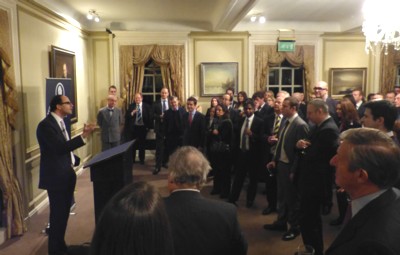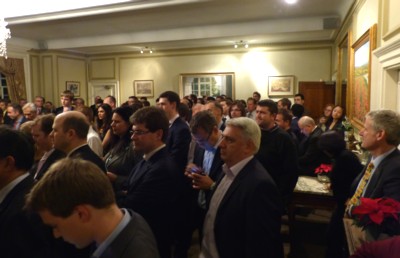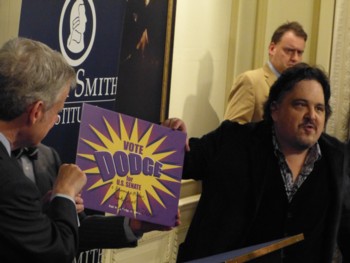We are developing the social individualist meta-context for the future. From the very serious to the extremely frivolous... lets see what is on the mind of the Samizdata people.
Samizdata, derived from Samizdat /n. - a system of clandestine publication of banned literature in the USSR [Russ.,= self-publishing house]
|
The point is that recessions are not caused by a lack of demand. They are caused by people making the wrong things (i.e. destroying wealth). We know they are because enterprises make losses and sometimes go bust. Recessions end when people start making the right things. All that money printing does is keep people making the wrong things. All that state spending does is encourage people to make even wronger things.
– Patrick Crozier comments, in a discussion sparked by his own posting about Keynes for the Cobden Centre, here.
I am finding the many jokes I hear about people going out shopping and thereby “rescuing the economy” less and less funny, and more and more stupid and tragic. These jokers seem really to think that this is how it works.
From about 1990 until about 2005, I held speaker meetings at my home in London SW1, on the last Friday of each month. I began them because I was a libertarian and we wanted such meetings, and because, having acquired a settled home, I could. And I ended them because their main purpose for me had been to stir up writing for the Libertarian Alliance, which by 2005 I was no longer doing. When the internet arrived as a mass experience, available to anyone with a computer, a telephone line and a few quid a month to spare, around the year 2000, I ceased being an editor of paper writings for an organised group, and became instead a citizen of the blogosphere. Most especially, I became a regular contributor to Samizdata. Suddenly, the blogosphere was where the action was, where the big opportunity was, and it supplied more than enough food for thought and for writing.
But now, my Last Friday of the Month meetings are to resume. Partly, I have discovered that their incidental benefits to me personally were more real than I had realised. Basically, I felt that, very gradually, I was losing touch with people who were in that vital social hinterland between friends and strangers.
But there is also a more public – altruistic, you might say – reason for me to crank these meetings up again. In retrospect, I think we can now see that the arrival of blogging was a most unusual time for us libertarians. Libertarian notions had spread rapidly during the years just before the internet and then blogging arrived among us. But because the number of libertarian enthusiasts involved was small compared to the population at large, these ideas had found few outlets in the late twentieth century mass media, which meant that we libertarians reacted to blogging like drowning sailors encountering a lifeboat. Meanwhile, our statist adversaries, many of them comfortably ensconced in what were clearly now the old school media, could at first only grumble about how their seemingly God-given intellectual hegemony had been so insolently challenged. At first, these hegemons behaved as if enough bitching by them about the new media, in the printed pages and on the TV chat and comedy shows of the old media, would send us amateur upstarts back to the oblivion from which we had so rudely emerged. When that didn’t work, they tried linkless fulminating in their, at first, very clumsily electrified newspapers. Only when it became clear even to them that the “new media”, and the new voices enabled by them, were here to stay, that anyone could say to anyone whatever anyone wanted to say, did at least some of the old school journos and organs start seriously adapting.
→ Continue reading: A libertarian meeting at my home on the last Friday of this month
I like this:
Given that time is a continuous variable, there is a certain arbitrariness to the way in which it is measured. For a long time, society has agreed a system composed of multiple units and one of those units, you may have noticed, just went up by one. Welcome to 2013.
It’s Simon Gibbs of Libertarian Home, greeting the new year and looking back over the old one. The posting contains many things of interest, but allow me in particular to draw your attention to one of Libertarian Home’s projects that Gibbs lists as having done well, in the year 2012:
Getting a push from Samizdata my video and article on the The Reality of UK Uncut is a late entrant from December.
The push in question being this. A reminder, if any of us Samizdata contributors need it, that our blog can make quite a difference, in this case to the morale of a fellow libertarian, with a bit of linkage that consumed only a fraction of the time and effort that went into the item being flagged up. When I did that Samizdata posting I had no idea how definite would be the boost supplied to Libertarian Home’s traffic. Good.
And here is a mention of another libertarian whose links can make a huge difference to whoever and whatever he links to. Says Gibbs:
The Newtown shooting however is the grim source of this year’s number one story. Receiving a push from Guido the story earned 10% of the sites total traffic in the last few days of the year. It’s an interesting kind of success story for a blog that starts with the death of 26 people, but it’s a success story that makes me proud.
Something like 2000 people saw that graph on this website, a graph that rubbished the idea that the UK’s “gun free” society is automatically safer than the United States as a whole. The real picture being far more complicated. It is a small contribution to a very important and intense debate but it is the kind of detailed analysis that can change the minds of many rational readers. The graph has also been widely copied and linked to and I like to think that this blog, and Richard’s number crunching will make it a little bit harder for the Obama administration to succeed in a further clamp down on gun ownership. If you believe, as I do, that gun ownership prevents violent crime then this blog’s success story is one that might make the world a little bit safer and a little bit better and that’s why we do this.
As I am sure Gibbs realises, at any rate in his more pessimistic moments, Libertarian Home is probably not daily reading in the White House. But, politicians do react to the opinions of others, even if their own opinions and ambitions remain unchanged by mere analysis. Every little helps.
The main problem with monetary policy today is that there is such a thing as monetary policy.
– This is buried deep in a not very recent (December 11th) blog posting by Detlev Schlichter (recycled at the Cobden Centre a day later). But it deserves pride of place here as our first quote of the day of 2013. It is the second sentence of the paragraph just above where it says: “If only the euro was golden!”
In far too many matters, when you look at Anything and what is going wrong with Anything, you find that the main problem with Anything policy today is that there is such a thing as Anything policy.
Okay, I admit it. This is me checking out how you post photos on Samizdata, with Michael Jennings sitting next to me to show me, what with him already having done this successfully.
Nevertheless, this is quite a fun photo. It was taken on November 28th of this year:

Words don’t fail me, but you surely know what I mean.
There’s the fact that Concorde was scrapped in 2003. There’s the weird colour changes imposed upon the dear old Union Jack (which were such a feature of life in London in this Olympic Year). There’s the fact that this is an item of weirdly designed Olympic stuff on sale and on display in a London shop (it was not the only one – trust me). And there is the fact that this weirdly designed Olympic object is still on sale now, months after the Olympics have been and gone. Michael assures me that Olympic crap will still be around in our shops for many more months yet.
There is probably plenty more to be said about this strange, strange thing, but I leave it to others to add such observations.
That Cyd! When you’ve danced with her you stay danced with.
– Fred Astaire, talking about Cyd Charisse. Quoted in the TV show Darcey Bussell Dances Hollywood, shown this afternoon on BBC2.
Incoming from Simon Gibbs of Libertarian Home, flagging up a video he has recently put up at YouTube. It is a report of a UK Uncut demo, which includes interviews with UK Uncut people, and some arguments against their arguments.
To me, the most important thing about this is that a libertarian has taken a video camera out there and actually done some reporting. And some editing. And he has put the resulting video out there for us all to look at and listen to. (It lasts just six minutes.)
I strongly agree with Gibbs that listening carefully to the arguments of people like those who speak for UK Uncut is worthwhile. The idea that, because the minds of people saying things we don’t agree with are mostly made up and unalterable, arguing with them is pointless, is just plain wrong. Others listen to these arguments. If counter-arguments are put, this will have consequences. Insofar as we libertarians disagree with these UK Uncut arguments, our own arguments will get sharper, as arguments always do when you actually listen to what you are arguing against.
Here, for instance, is what Gibbs said later, in his LH retro-report (where the video can also be viewed):
The main problem I have, and what the video focuses on, is that the numbers don’t stack up. Their avoidance loopholes would save 15% of the deficit if they were closed, but it would take 115% cuts, relative to the deficit, to pay off the accumulated debt in 37 years. Thirty seven years of services being trimmed will not work, I appreciate why they fear that, but what we really need is radical pro-growth policies and alternative sources of funding wherever it can be done. Democracy has failed to run its bank account properly. We need to bail it out, pay off the debt, and cut the responsibilities which we entrust to its institutions.
The video itself might have been (even) better, in that Gibbs might have put that point rather more eloquently to the people he was talking to than he actually did. But such nitpicking misses what is crucial here, which is that there are times when the important thing is just to start doing it. How many libertarian videos did you stick up on YouTube last week? More than zero? That’s infinity percent more than most of us have managed. Sometimes load/fire/take aim is the way to go. Simon Gibbs has now loaded and fired. His aim, pretty good to start with, will go from good to even better. As a piece of reportage, about what UK Uncut demos are like, this video is already excellent.
In all the ways that truly matter this is a terrific piece of work, and I really hope Gibbs keeps at it.
Incoming from Alex Singleton:
I know you’ve described Noam Chomsky as “a monster” before now, so I thought you might be interested in a review that I have written of his book Manufacturing Consent.
Singleton’s review is entitled “Manufacturing Consent by Chomsky and Herman isn’t just wrong: it is ludicrous”. Chomsky argues that multinational corporations have it all their own way in the mainstream media. Singleton argues otherwise:
As Herb Schmertz, former VP at Mobil Oil, put it in a 1986 book: “[Many people are] under the false impression that the wealthier the organization, the more seriously its views are taken. I wish that were true! If anyone still believes that old canard, I invite them to spend a month working for a major oil company during the next fuel shortage.”
Indeed.
Having worked in the media himself, Alex Singleton now earns his living advising organisations, big and small, about how to handle the media. So, if you run a wealthy organisation, and you are facing some sort of crisis and consequently are liable to get a media beating, why not give Singleton a call? Maybe he could manufacture some consent for you.
Is insomnia the big disease of the twenty first century? Famously, markets are now open for business twenty four hours a day, and have been for several decade. Someone somewhere always to buy or to sell, and has the electronic trickery to do it.
Goddaughter 2: One of her teenage bizarrenesses was doing social media – gossipping as we used to call it – until 5am, while still starting school on time. The word is she’s over this now, thank goodness. But, it wasn’t just her. She was gossipping with fellow teenage insomniacs.
Me: My sleep during the winters is now deranged by cricket matches all over the world, most of it played in my night time. (I have recently learned how to watch such cricket, at no monetary cost, on my computer. I’d rather not say how.) Last night, I woke up at 3.30am, to watch England beat India in Kolkata. I also got to bed last night, again, at 5am.
Everyone: Just able to live, virtually, all around the clock. And it’s a positive feedback loop, a network effect. The more people are doing things all around the clock, the more excitements there are everywhere, all around the clock, and the more sleep patterns everywhere are deranged.
In former centuries, without the ability to communicate cheaply and interestingly with places where it was broad daylight, there was, at night, a lot less to do. Other than the obvious. The obvious has always caused insomnia, for those who can’t get enough of it. Now all the fun you can have with your clothes on (or not, it doesn’t matter) has joined the obvious. As culture (including politics) goes ever more global, there are ever more inducements to keep paying attention to your particular thing, as the small hours get bigger.
The other big techno-trend I think I see now is computerised mobility. For my generation, the two big technological dramas were the arrival of television and the arrival of computers and the internet. But perhaps historians will see those two dramas as just the one. People stopped going out, and instead stayed at home, staring at electronic screens and listening to electronic boxes. The first upheaval did indeed culminate in television, having been preceded by radio and gramophones, because all of that stuff kept people at home, as did the early internet. The second upheaval was all these toys becoming mobile. Looking at things this way, the Sony Walkman becomes more significant than the first personal computers. The first computers made the telly a bit more intelligent and a bit more fun, but you still stayed at home and got fat and lazy. The Walkman got people up off their fat arses and out and about again. And now the iThings and their non-Apple progeny are making the Get Out More life even more attractive, to the point where you can do all your work on the move.
Mobile technology is all still a bit clunky, I think. All those wires and headphones and little thingies to put in your pocket somewhere. Which is why I think the development of computerised glasses – or spectacles (merging the two meanings of that word into one again) – may prove to be so significant. And in the age of total surveillance and universal face recognition, great big non-see-through glasses are going to become very popular, even if they merely look like head-held TVs. (Clever spectacles will of course make photographing other people, literally in a blink, even easier and even harder to spot.)
I have the feeling that somehow or another techno-induced insomnia and techno-mobility are pretty closely connected. One rather obvious connection is that people who take exercise sleep better. But there are surely many other connections.
Here’s one. There is a class of semi-mobile technology which I find invaluable for getting to sleep. A problem for insomniacs is that whereas they (we) can doze off in front of the telly with ease, once in bed, the combination of the effort involved in actually getting to bed, and then the silence, can be hideously arousing. Silence now being an oddity, it keeps many of us awake. (This may be why I write better when no music is playing.) Two tricks I have learned for getting to sleep are (a) watching dvds on my little portable telly, and then (b) playing music very quietly beside the bed. I soon get drousy, and the slight effort involved in putting aside the telly and swtching on the music, or just switching the telly over to music, is not enough to seriously wake me up.
So anyway (I have only recently noticed that “anyway” means “I am about to disconnect from you, for no obvious reason other than that I just am”), blah blah blah. Discuss. Or, I have bored you so completely that you will now go to sleep.
Last night, before going to sleep, I switched on the radio commentary for the India England cricket match now in progress in Kolkata, so that, in the event that I did the opposite of dozing off (dozing on?) I would keep up with England’s currrently very satisfactory progress in that game. With luck, tonight and tomorrow night, England will bowl out India cheaply in their second innings and England will go 2-1 up in the four game series. Find out if that happens by looking, e.g., here.
So far so sporty. But this morning, waking up at tea time, so to speak, I found myself listening, not to England’s batsmen batting and India’s bowlers bowling, but to this broadcast (that link switches it on straight away which you might not like – maybe going here would be more convenient – details down a bit on the left) done by the BBC’s long-time cricket commentator Jonathan Agnew. This broadcast was about a charitable enterprise in Kolkata which rescues street children, gives them somewhere unscary and unprecarious and unchanging to live, and which then educates them.
This broadcast lasts a mere fifteen minutes, otherwise it would have gone on longer than the tea interval. The enterprise it reports on is called Future Hope.
Learning about Future Hope is the sort of process that causes people with opinions about how the world should be organised to say: “and this just goes to show how right I have always been about …”. To me, what comes through is how morally uncorrupted these children were when first rescued, it having been precisely their moral excellence that got the attention of the man, a chap called Tim Grandage, who started Future Hope, in order to rescue some of these children from their terrible physical deprivations and torments. The children who have grown up in the care of Future Hope sound, in this broadcast anyway, like the very definition of the “deserving poor”.
This being a Test Match Special broadcast, you would expect cricket to figure in the story, and it does, although for a long time rugger seems to have been a bigger deal than cricket for Future Hope. Is Grandage a rugger enthusiast, I wonder? Indeed he is. Ever since it started, Future Hope has used sport to physically improve, to socialise and to excite its charges, and generally to give them positive and amusing things to think, and thereby helping to take their minds off past miseries. But India being India, Future Hope also wants to develop its cricket. The England Cricket Team have got involved, and they recently spent a day at Future Hope, as the broadcast describes. England’s formidable new captain, Alastair Cook, opened their new cricket coaching operation for them. Good for him.
This is the first time I have ever heard about Future Hope, and I have no idea if it really is as good a thing as Jonathan Agnew and the Future Hope people he talked to made it sound. These days, you can’t help but be slightly concerned about such a phenomenon. But it did sound like a very good thing indeed. And I want to believe that if there were any doubts about its excellence, the England cricket team would not have gone anywhere near it.
Last night I attended the Adam Smith Institute Christmas Party.
Here are ASI President Madsen Pirie and the speaker for the evening, Allister Heath, editor of City A.M., kindly taking the time to pose together for me:
So, there didn’t seem to be any problem about me taking photos. But actually, it rather seemed as if there was. Try as I might, I don’t seem to be able to get away from this theme, in my bloggage of this week.
The most famous personage present was a very recognisable Member of Parliament. And in quite a few of my crowd shots, he is to be seen glaring rather angrily, sideways, at my camera, rather than in the direction he ought to be have been looking, so to speak, as if to say: I didn’t come here to be photoed. I came here to get away from all that crap and to be among friends. Fair enough, no pictures of or naming of him.
Besides which, the public point made by such gatherings, insofar as there is one, and aside from the matter of everyone having a fine old time and fine old natter, catch-up, etc., was not so much the quality of those present, qualitative though it definitely was, as the quantity of that quality. These people were not merely rather impressive. There were a lot of them:
That’s Heath holding forth, and that’s the front of his audience. This is the back of his audience:
Spot the join. Unless my eyes are seriously deceiving me, you can’t. I am pretty sure there is no join to spot, and that there were further people present, to the right of those at the front, and to the left of those at the back. My camera has a gratifyingly wide angle of vision, but was not nearly wide enough in its vision for this gathering, given where I was standing.
As to the content of Heath’s remarks, well, anyone who knows their City A.M. will know that he is in a pretty gloomy state of mind about the immediate prospects of the British economy. There was a copy of City A.M. in the lobby, and I took notes (with my camera) of stories with headlines like UK is facing a lost decade for growth and More Yuletide misery for the City as well as Allister’s own editorial of that morning, entitled Politicians need to stop moralising – and reform our taxes. His editorial today is entitled A case of lies, damn lies and our rocketing national debt.
And as if to match that mood, most of us were dressed in “office attire”, meaning dark and funerial. Even I broke the habits of a decade and dressed funerially. It neither looked nor felt like a Christmas Party. The only thing Allister Heath could think of to cheer us up was to say that for all the governmental mismanagement of our country’s finances, at least technology continues to advance, although no thanks to us. He mentioned, in particular, Google’s robot cars, which is a story that I have been attending to myself for quite some time, and which I intend to blog about here Real Soon Now.
The end of Heath’s talk was hijacked by this guy:
Yes it’s Andrew Ian Dodge, presenting some Andrew Ian Dodge for Senator propaganda to Eamonn Butler, so that Eamonn Butler can exhibit it, somewhere. Now there‘s a man who has no problem about being photographed.
Councillor Harry Phibbs, top right, is not impressed by this pushy American.
This guy, on the other hand, preferred to hide his face behind his iPad:
Well, no not really. He was taking a photo, of me.
For more coverage on The Onion’s Sexiest Man Alive 2012, Kim Jong-Un, please visit our friends at the People’s Daily in China, a proud Communist subsidiary of The Onion, Inc. Exemplary reportage, comrades.
– The Onion adds an update to its story of November 14th. Mick Hartley explains.
|
Who Are We? The Samizdata people are a bunch of sinister and heavily armed globalist illuminati who seek to infect the entire world with the values of personal liberty and several property. Amongst our many crimes is a sense of humour and the intermittent use of British spelling.
We are also a varied group made up of social individualists, classical liberals, whigs, libertarians, extropians, futurists, ‘Porcupines’, Karl Popper fetishists, recovering neo-conservatives, crazed Ayn Rand worshipers, over-caffeinated Virginia Postrel devotees, witty Frédéric Bastiat wannabes, cypherpunks, minarchists, kritarchists and wild-eyed anarcho-capitalists from Britain, North America, Australia and Europe.
|









